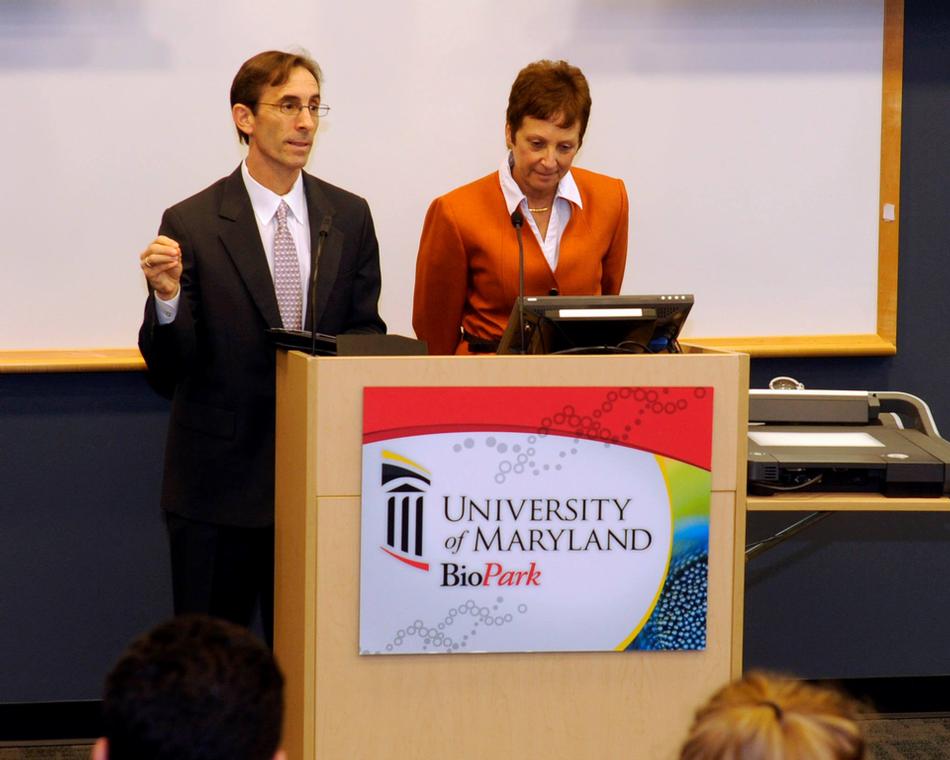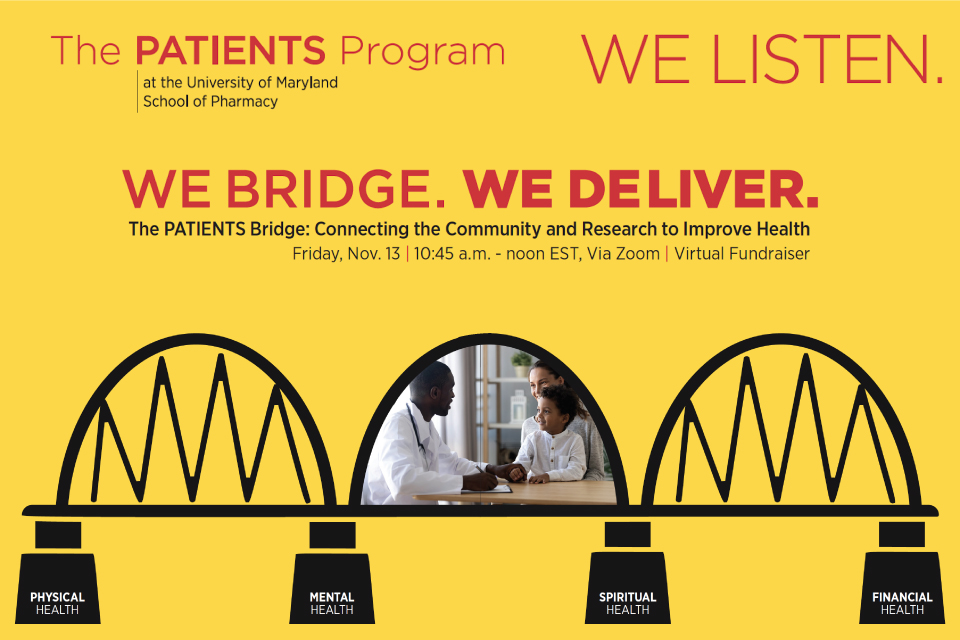Mullins Spotlights PATIENTS Program, PCOR During Founders Week Lecture
Delivered with Dr. Robin Newhouse, presentation emphasized listening to patients and caregivers’ voices across all stages of research.

By Malissa Carroll
November 3, 2014
Faculty, staff, and students from across the University of Maryland, Baltimore (UMB) gathered in the BioPark Life Science Conference Center on Oct. 13 to listen as C. Daniel Mullins, PhD, professor and chair of the Department of Pharmaceutical Health Services Research (PHSR) at the University of Maryland School of Pharmacy, and Robin Newhouse, PhD, RN, NEA-BC, FAAN, professor and chair of the Department of Organizational Systems and Adult Health at the University of Maryland School of Nursing, kicked off the University’s Founders Week with their Researchers of the Year lecture.
Both Mullins and Newhouse are internationally recognized for their work in the field of patient-centered outcomes research (PCOR), which aims to ensure that patients and caregivers’ voices are heard as researchers conduct studies to assess the benefits and harms of existing treatment options for a wide range of illnesses. In his opening remarks, Jay A. Perman, MD, president of UMB, declared, “Incorporating the patient’s voice in research is considered revolutionary by many researchers, but not to Drs. Mullins and Newhouse. To these two pioneers, this practice was inevitable. Today, we honor them for teaming up and joining their research efforts to benefit the individuals who matter most – those who live in our community, in this city, in this state, and in the world.”
To illustrate the importance of incorporating the patient’s voice when conducting research, Mullins invited Gail Betz, MLIS, a research, education, and outreach librarian at the University’s Health Sciences and Human Services Library, to begin the lecture. Betz spoke about the obstacles that she has encountered in her attempts to participate in clinical trials as a visually-impaired patient.
“Since being diagnosed with a retinal degenerative disease, I have wanted to participate in clinical trials to help find better treatments,” said Betz. “However, I found it very difficult to get involved, even though I continuously sought new opportunities.”
In 2013, Betz moved to Baltimore, where she learned about the Patient-Centered Involvement in Evaluating the Effectiveness of Treatments (PATIENTS) program. Directed by Mullins, the PATIENTS program empowers patients like Betz to propose questions about their health care concerns and actively participate in studies to answer them.
“After learning about Dr. Mullins’ efforts to engage patients in research, I reached out to him to see how I could help,” continued Betz. “It has been wonderful to work with someone who truly sees the value that patients can bring to this area.”
Initially funded by a five-year, $5 million grant from the Agency for Healthcare Research & Quality (AHRQ) [Grant Number: R24 HS22135-01], which is supported by organization’s PCOR trust fund, the PATIENTS program aims to foster sustainable partnerships with local, regional, and national communities of diverse patients and health care systems. Researchers participating in the program work with the program’s partners to conduct PCOR and develop novel ways to publicize study results to patient communities.
“The PATIENTS program challenges the status quo by embracing the fact that patients should have a voice in research,” said Mullins. “Patients don’t want to know if their medication works better than a placebo. They want to know if it’s the best drug available for their unique situation. The PATIENTS program ensures that the outcomes that researchers collect not only satisfy the needs of regulators like the Food and Drug Administration, but also translate into results that are meaningful to patients.”
He added, “Providing patients with results that are meaningful to them is the best way to motivate them to take an active role in their health care.”
In addition to highlighting the goals and objectives of the PATIENTS program, Mullins educated the audience about the differences between PCOR — the field of research on which the PATIENTS program focuses — and another expanding field of research known as comparative effectiveness research (CER). Though researchers in both fields compare existing treatment options to assess benefits and harms to help patients and their caregivers make more informed health care decisions, Mullins noted, “It’s when researchers bring patients in not only as human subjects, but as advisors, that they transform CER into PCOR.”
Speaking about her study through the PATIENTS program to improve heart failure outcomes in rural hospitals, Newhouse, who first met Mullins through her work on the Methodology Committee at the Patient-Centered Outcomes Research Institute (PCORI), explained how incorporating patients as advisors in the study transformed its design as well as the outcomes collected.
“We engaged patients from the beginning to help ensure that the interventions we tested are the interventions that matter most to them,” said Newhouse. “We also worked with them to ensure that the methods we used and the outcomes we measured are those most likely to answer their questions. Our team has fundamentally changed our research approach based on our partnerships with patients.”
Following her portion of the lecture, Newhouse invited three UMB researchers who recently received grants from PCORI to share information about their patient-centered research initiatives with the audience: Gloria Reeves, MD, associate professor of psychiatry at the University of Maryland School of Medicine; Susan dosReis, BSPharm, PhD, associate professor in PHSR; and Carla Alexander, MD, FAAHPM, assistant professor of medicine and director of palliative care for clinical programs at the School of Medicine’s Institute of Human Virology. Each researcher discussed how incorporating patients and caregivers’ voices in their studies helped reshaped the projects, revealing the research methods and outcomes that would best serve their desired populations — the patients themselves.
“It’s easy to demonstrate effectiveness for clinical outcomes, such as symptom reduction, but those outcomes might not be the most important outcomes for families,” said dosReis. “It can be very difficult to demonstrate the outcomes that matter most to families. However, by understanding how our patients and their caregivers prioritize outcomes, we can hit entirely new metrics to help determine the comparative effectiveness of existing treatments.”
To conclude the lecture, Mullins and Newhouse invited Del Price, member of the Mt. Lebanon Baptist Church – one of the PATIENTS program’s community partners – to share her perspective on interacting with health care delivery systems as a caregiver. Newhouse and Price also simulated an interaction between researchers and caregivers to demonstrate how researchers can take the first step to engage patients and caregivers in their work.
“In this era of health care reform, I see a lingering disconnect within the health care delivery system, specifically related to how health care providers, insurance companies, and the pharmaceutical industry communicate with patients,” said Price, who shared her experience helping her mother receive the shingles vaccine, a vaccine highly recommended for individuals age 60 years or older. “Although we were told this vaccine was covered by Medicare, we later found that we needed to pay $200 out-of-pocket. How would a patient know this before receiving the vaccine? Is it possible for individuals like my mother, who lives on a limited budget, to effectively seek this type of preventative care?”
She added, “I suspect dilemmas such as this will continue to arise as new measures related to health care reform are implemented over time. However, I believe that patient-centered outcomes research can help resolve these dilemmas, and am delighted to participate in today’s program because I appreciate Drs. Mullins and Newhouse’s leadership in this field.”



